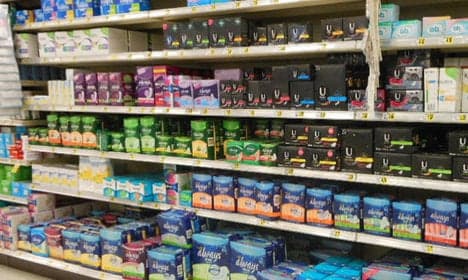French women warned about 'toxic tampons'

A leading consumer rights group in France has raised the alarm that tampons and items of protection contain “potentially toxic” substances.
In their latest magazine 60 million consumers have alerted women to the presence of potentially “toxic residues” in tampons and other forms of protection.
After ordering its own scientific testing on various female sanitary products the organisation claims there are traces of “dioxins, glyphosate and other pesticides” albeit in low levels.
These chemicals can interfere with hormone systems (endocrine disruptors).
"Could these dioxins have this kind of effect on vaginal mucosa? There is currently no study to say for sure," Victoria N'Sondé from 60 Millions Consumers told BFM TV.
The average women is said to use between five and ten thousands tampons throughout their whole life.
According to the World Health Organisation "Dioxins are highly toxic and can cause reproductive and developmental problems, damage the immune system, interfere with hormones and also cause cancer."

The group analysed 11 items of sanitary protection for women and found that five of them contained potentially toxic residues.
The magazine says they found traces of dioxins in tampons made by two major brands out of the three they tested.
The Tampax brand “Compak Active regular fresh” was said to contain molecules from the chlorine family.
It also claimed that “glyphosate”, a herbicide used in weed killer, was found in pantyliners that were made by the Organyc brand that claims, as it sounds, to be "organic".
Following the investigation the National Institution for Consumers has demanded the government step in and enforce stricter controls on the products and greater transparency around labeling.
A petition launched in France that calls for more information to be given regarding the chemicals used in tampons and sanitary products has gained 180,000 signatures.
"When we buy cosmetic products we can get information on what they contain and how they are made, but when it comes to something we use everyday that is in contact with our intimate parts, we have no knowledge of what is in it," Mélanie Doerflinger, the student who launched the petition told BFM TV.
The study comes just a day after another French consumer group released details of 185 cosmetic products that people should avoid because they contained potentially hormone changing chemicals.
SEE ALSO: French told to avoid 185 everyday cosmetic products

Comments
See Also
In their latest magazine 60 million consumers have alerted women to the presence of potentially “toxic residues” in tampons and other forms of protection.
After ordering its own scientific testing on various female sanitary products the organisation claims there are traces of “dioxins, glyphosate and other pesticides” albeit in low levels.
These chemicals can interfere with hormone systems (endocrine disruptors).
"Could these dioxins have this kind of effect on vaginal mucosa? There is currently no study to say for sure," Victoria N'Sondé from 60 Millions Consumers told BFM TV.
The average women is said to use between five and ten thousands tampons throughout their whole life.
According to the World Health Organisation "Dioxins are highly toxic and can cause reproductive and developmental problems, damage the immune system, interfere with hormones and also cause cancer."

The group analysed 11 items of sanitary protection for women and found that five of them contained potentially toxic residues.
The magazine says they found traces of dioxins in tampons made by two major brands out of the three they tested.
The Tampax brand “Compak Active regular fresh” was said to contain molecules from the chlorine family.
It also claimed that “glyphosate”, a herbicide used in weed killer, was found in pantyliners that were made by the Organyc brand that claims, as it sounds, to be "organic".
Following the investigation the National Institution for Consumers has demanded the government step in and enforce stricter controls on the products and greater transparency around labeling.
A petition launched in France that calls for more information to be given regarding the chemicals used in tampons and sanitary products has gained 180,000 signatures.
"When we buy cosmetic products we can get information on what they contain and how they are made, but when it comes to something we use everyday that is in contact with our intimate parts, we have no knowledge of what is in it," Mélanie Doerflinger, the student who launched the petition told BFM TV.
The study comes just a day after another French consumer group released details of 185 cosmetic products that people should avoid because they contained potentially hormone changing chemicals.
SEE ALSO: French told to avoid 185 everyday cosmetic products

Join the conversation in our comments section below. Share your own views and experience and if you have a question or suggestion for our journalists then email us at [email protected].
Please keep comments civil, constructive and on topic – and make sure to read our terms of use before getting involved.
Please log in here to leave a comment.